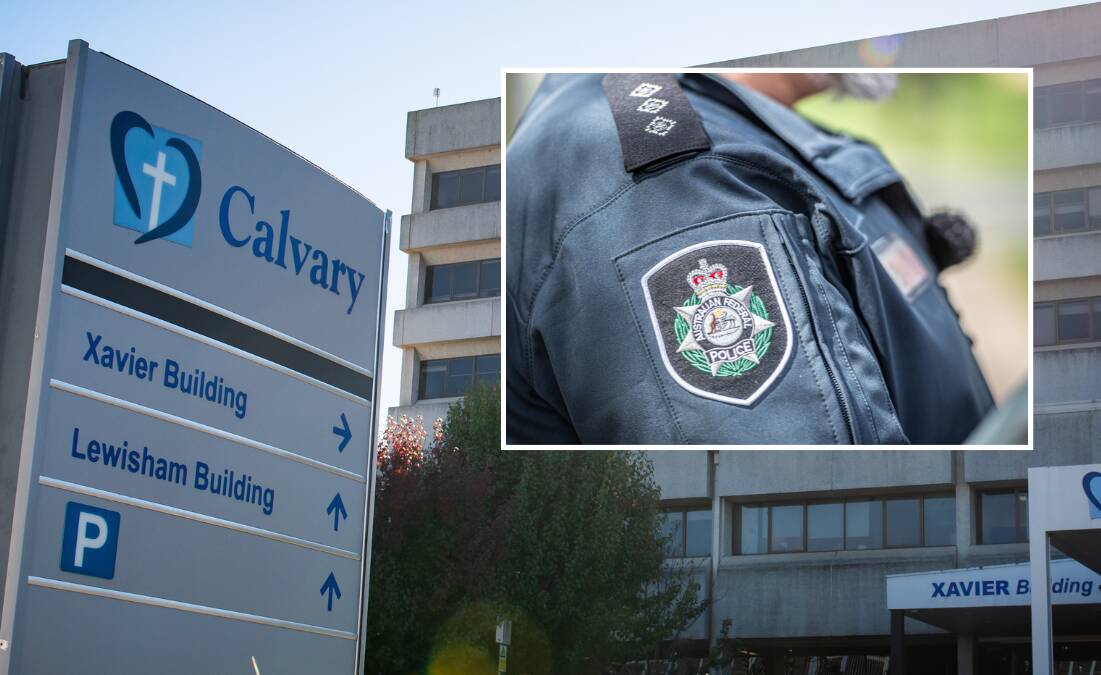
Calvary has attacked "draconian" proposed legal powers for police to enforce the compulsory acquisition of the Bruce public hospital.
Police could be granted power to use "force as is reasonable necessary" to ensure compliance with the takeover, government legislation says.
An official would first need to apply to the Magistrates Court, which would make an order allowing police involvement.
But the government says it has no intention to use the power and would rely on it only in "the most unlikely of circumstances".
The Health Infrastructure Enabling Bill would also give the government a range of powers in relation to Calvary before the official acquisition.
Officials would be allowed to enter the hospital, provided "reasonable written notice" is given to carry out inspections, undertake a stocktake of hospital equipment and assess what's needed when Canberra Health Services takes over the hospital.
Under the legislation, Calvary would need to appoint a senior executive to be a contact person for these matters and this person would be required to develop a transition plan for the hospital.
The government has planned to take over the hospital from July 3 but this date can be changed if needed. The laws are expected to pass the Legislative Assembly on May 31 with support from Labor and Greens members.
Legislation was introduced to the territory's parliament last week, only one day after the government announced its plans.
Calvary was shown the legislation only one day before it was introduced. A spokeswoman said the organisation was still considering its legal options in relation to the bill.
"Calvary's initial review of the proposed legislation indicates the territory can effectively tear up our contract without the usual consequences one expects, while also enabling it to enter the hospital and carry out a range of activities before the final acquisition occurs," she said.
"Calvary is extremely concerned about a number of draconian measures in the bill, including that the Magistrates Court can authorise the use of police force in enforcing the bill."

The territory's acting Opposition Leader Jeremy Hanson said he was concerned at the measure around bringing in police.
"It's brutal legislation and everyone should be pretty frightened that the government is able to forcibly acquire this and demand all this information from Calvary," he said.
But the government does not plan to use this power, an ACT government spokeswoman said.
"This would be in the most unlikely of circumstances where the ACT government is unable to access what is required to assist the transition," she said.
The Calvary spokeswoman said the organisation was also concerned at the timeframe chosen for the acquisition, saying it was too short to ensure a "smooth and safe transition of patient care".
The government said it had acted on expert advice that a shorter transition period provided more certainty for staff.
"A lengthy transition process that drags on for months would prolong the uncertainty for staff," the government spokeswoman said.
Health Minister Rachel Stephen-Smith had previously said this was based on lessons learned from similar situations. The spokeswoman did not provide a specific example but said it was based on processes from other jurisdictions in Victoria and Western Australia.

But project managers have pointed out that acquisitions have a habit of being more complex than they initially seem.
"History has shown us that project schedules tend to blow out," Patrick Albina, Director of Quintessential Consulting, said.
"Any sort of change process, whether it's a merger or an acquisition, can be a mechanical process."
Mr Albina, who founded the company which has advised governments from across federal, state and councils, said different stakeholders with competing interests come out of the woodwork with issues that were never assumed or anticipated.
"The danger is that if the people running a project incorrectly assume that it's mechanical when it isn't, that's when blow-outs in the time frame and cost occur," he said.
Calvary will be unable to oppose the takeover, a leading expert on property law said, but there would be a legal dispute after it.
"The terms of the bill itself do not appear outside the powers of the ACT government but a lot of the crucial matters will be determined by the regulations, including how compensation will be worked out and how any dispute about compensation will be resolved," Wayne Morgan, associate professor at the ANU College of Law, said.
The law says that compensation to Calvary for the loss of its enterprise should be on "just terms". If there is a disagreement, the takeover would still go ahead but the dispute on "just terms" could then be decided in court.
The meaning of "just terms" is unclear. It might be based on market value but would just be the same as it, Mr Morgan said.
One way Calvary could scupper the take-over would be if it persuaded the Commonwealth to veto it but the federal government has already ruled this out.
A spokesman from the federal Department of Health said under the National Health Reform Agreement the federal government did not have the power to intervene in the acquisition. The NHRA sets out the financial and governance arrangements for Australia's public hospital system.
"The NHRA recognises that state and territory governments are the system managers of their public hospital systems, responsible for system-wide public hospital planning and performance and for determining arrangements for the delivery of public hospital services within their jurisdiction," the spokesman said.
"This includes decisions regarding the use of the private or not-for-profit provider to operate a public hospital."
We've made it a whole lot easier for you to have your say. Our new comment platform requires only one log-in to access articles and to join the discussion on The Canberra Times website. Find out how to register so you can enjoy civil, friendly and engaging discussions. See our moderation policy here.







